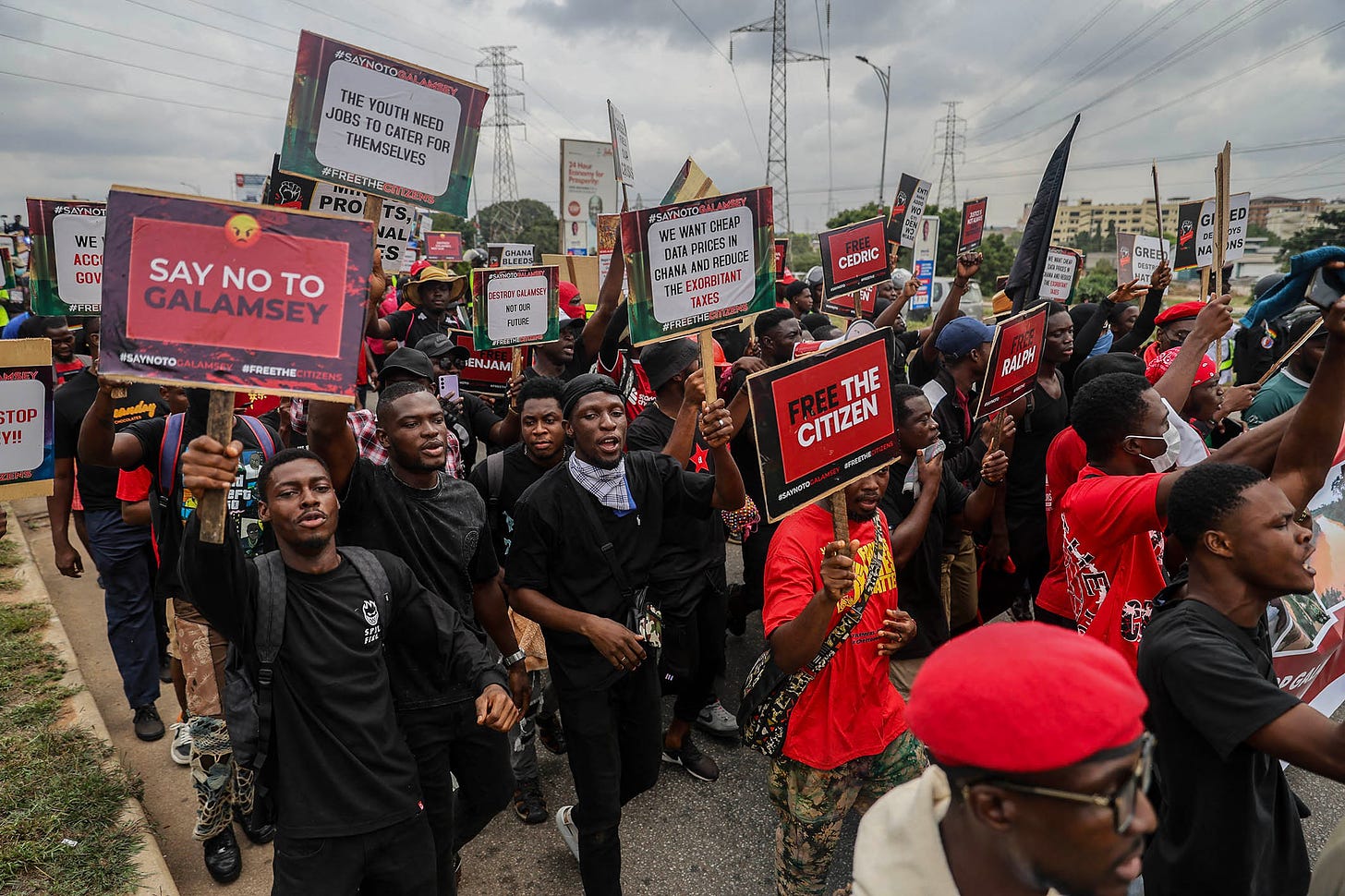Akufo-Addo has dug himself into a political hole
Ghana’s president has failed to keep a promise to end illegal ‘galamsey’ gold-mining – and protesters are not letting him forget it.
Delali Adogla-Bessa and Yaw Obrempong Ampofo in Accra

On the back of a historic election win, Ghanaian president Nana AkufoAddo made a bold declaration in 2017: “I am prepared to put my presidency on the line in the fight against galamsey”, he was quoted as saying in the state-owned Daily Graphic.
But with just three months remaining of his presidency, that boldness was nowhere to be seen. When protesters took to the streets chanting “Stop galamsey!” at least 40 of them were arrested by Akufo-Addo’s government.
Galamsey is the popular Ghanaian term for what used to be small-scale artisanal gold mining. But is now often mechanised, illegal and perceived to be clandestinely bankrolling political bigwigs. Some Ghanaians have been organising to protest against it, arguing that the practice is destroying farmlands and forests, and contaminating rivers and other sources of freshwater.
Ghana’s Water Resources Commission estimated in 2017 that 60% of the country’s water bodies were polluted. It said that illegal mining is a leading cause of this pollution – thanks to the dumping of silt and hazardous materials like mercury and cyanide that are used in unregulated gold processing – along with industrial waste and household waste disposal. The problem is especially pronounced in the resource-rich south-west river basin.
“The water is like oil,” says fisherman Phillip Abambe in the fishing village of Sanwoma, along the Ankobra River. “The fish can’t survive in it.”
Toxic techniques
An estimated 85% of small-scale mining in Ghana is considered to be illegal and/ or informal. This figure has expanded dramatically over the past two decades. Many protesters believe that this expansion has been driven by people with ties to the political elite, who they allege clandestinely employ artisanal miners or buy their processed gold. This, protesters add, explains why the government has been so reluctant to take real action. Ghanaian law sets a minimum 15-year jail term for engaging in illegal mining, but it is rarely enforced.
Rural Ghanaians are drawn to small-scale mining because it tends to fetch more income than farming or other informal work, especially given the recent increase in gold prices. An ounce of gold is now worth $2,600 on the international market, compared with $1,200 in 2014. Artisanal miners are often paid as much as 70% of global market prices, which is a lot more than one can say for cash crops like coffee.
But digging for gold comes with the unseen danger of heavy metal pollution. To extract gold from the dirt they dig up, miners add mercury. Gold ore binds to mercury to form an amalgam of both elements. To recover the gold from that amalgam, the miners heat it, expelling toxic mercury vapours into the air.
“I am prepared to put my presidency on the line in the fight against galamsey”
“The heavy metals go into the water bodies. They go into the air as vaporised mercury and into the soil,” says Enyonam Gbadago, a scientist with the NGO Pure Earth Ghana, which studies polluted rivers and food systems. Exposure to heavy metal pollutants is associated with congenital defects in human beings, among other health dangers.
Ghanaian authorities have sometimes shut down water treatment plants after learning that their water sources are heavily polluted. The recent wave of antigalamsey protests were partly sparked by a water shortage in the historically significant towns of Cape Coast and Elmina due to polluted rivers.
Even before the protests, galamsey caught the attention of some workers’ unions, which announced protest strikes. “The fact that unions are striking over environmental issues rather than traditional labour concerns underscores the severity of the illegal mining crisis,” Bernard Owusu, chairman of the Trades Union Congress, tells The Continent.
Akufo-Addo has yet to speak publicly about the renewed uproar over galamsey, but he met the largest coalition of unions and convinced the workers’ leaders to call off the planned nationwide strikes. A statement from his office said he was committed to ending illegal mining, citing another planned deployment of soldiers to crackdown on illegal miners and a move to reverse a law his government passed to allow mining in forest reserves.





